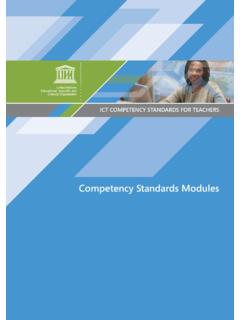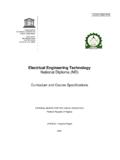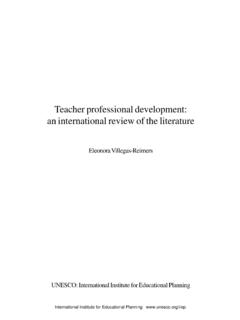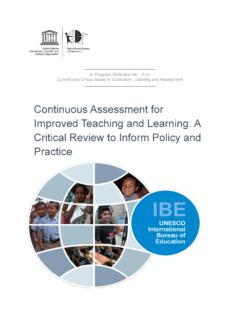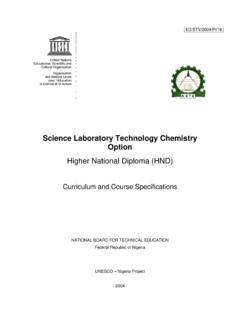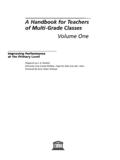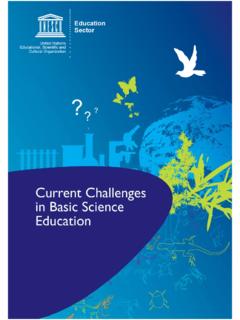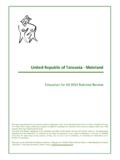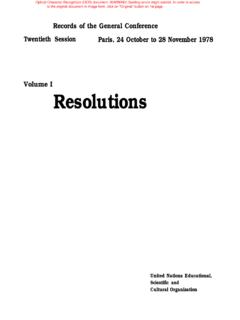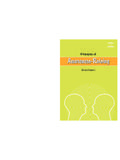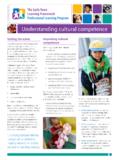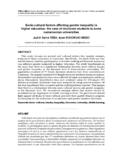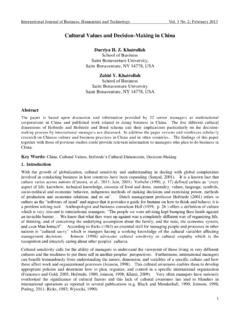Transcription of The Role and function of the school (its teachers) in …
1 The noie and function of the school (its teacher) ill the promotion of inspect for human values and dignity, of cultural understanding , tolerance and peace . ; ' .V ,3 '-fr. 'v:*^k';.. -, ^v^ -- ' "--: > ?:'->& -"^t^-}' -^yis':' $<*i -?'"-Monograph prepared for UNESCO by contract with the World Confederation of Teachers (WCT) by the Education and Research Committee of the South African Council for Educators (SACE) and approved by Prof Bengu Minister of Education of the Republic of South Africa Commissioned author Dr Ben Parker, Research Professor, Department of Education, University of Natal, Pietermaritzburg South African Council for Educators Supervising editor Mr Duncan Hindle, Chairperson, Education and Research Committee July 1996 UNESCO, United Nations Educational, Scientific and cultural Organization 7, place de Fontenoy 75352 Paiis 07 - SP Tel.
2 + 33 1 Fax+ 33 1 WCT, Worid Confederation of Teachers 33, rue de Treves 1040 Bruxelles Tel.+ 32 2 Fax+ 32 2 22 SACE, South Afiican Council for Educators Box 8228 Pretoria 0001 Tel.+ 27 12 Fax+ 27 12 The vieivs and opinions expressed in tl s study are those of the National team and do not necessarily reflect those of UNESCO. TABLE OF CONTENTS PREFACE INTRODUCTION PART 1: AN OVERVIEW OF THE TRANSITION TO DEMOCRACY 1. The promotion of a Human Rights culture 2.
3 The transformation of South African society The Reconstruction and Development Programme PART 2: POLICY DOCUMENTS AND LEGISLATION 3. National aims in South Africa as expressed in Government documents The South African Constitution Transitional provisions The Bill of Rights Educational aims as expressed in Policy Documents White Paper I White Paper II 4. Legislation National Education Policy Act South African Qualifications Authority (SAQA) Act South African Schools Bill Education Labour Relations Act and Labour Relations Act PART 3: IMPLEMENTATION OF POLICY 5.
4 Translation of policy into classroom practice Coping with diversity Democratic classroom practice school governance 6. Curriculum reform Interim processes Opportunities in the curriculum for human rights promotion Principles informing the curriculum Core competencies school ethos 7. Teacher education Defining teachers The National Teacher Education Audit The structural location of Teacher Education Teacher education programmes Pre-service teacher education Ongoing professional development of teachers New remuneration structures for educators 8.
5 The role of the school Community in the promotion of human rights school and community The Culture of Learning Other role-players Media and education 9. The role of the organised teaching profession in the promotion of human rights The organisation of teachers Unionism and professionalism The equitable distribution of human resources The role of the organised profession in promoting ideals Teachers as role models Location in the community As role models for pupils The South African Council for Educators 10.
6 Problems of implementation Introduction Education and human rights in rural areas Conflicts over values PART 4: CONCLUSIONS AND RECOMMENDATIONS 11. Conclusions 12. Recommendations BIBLIOGRAPHY NOTES ON THE AUTHORS PREFACE Last year the World Confederation of Teachers (WCT), an international non-governmental organization, holding consultative status with UNESCO, was contracted by UNESCO to prepare the present monograph in collaboration with the South African authorities, including the UNESCO National Commission.
7 Con-sequently a WCT delegation visited South Africa and made contacts with the Minister of Education, Prof. Bengu, through his representatives, as well as with the various education trade unions and universities. Following these contacts a preliminary meeting was convened by Mr. C. Opperman, President of the South African Parastatal and Tertiary Institution's Union (SAPTU) to which were invited: Prof. Lemmer - University of South Africa, Me. E. Nonjonga - University of South Africa, Me.
8 E. Von Klo g - Vista University, Prof. N. du Preez - Technikon Pretoria, Prof. M. van Staden - Teachers Training College Pretoria, Me. S. Steenkamp - Vocational and Educational Development Company, Dr. Davies - National Association of Professional Teachers of South Africa (NAPTOSA), Dr. A. le Roux - Department of Education and Training, Me Rose - United South African Trade Union (USATU), Mr. T. Nxesi - South African Democratic Teacher's Union (SADTU), Mr. Honwana -UNESCO, Me.
9 J. Glenny - South African Institute for Distance Education (SAIDE), Mr. C. Bouwer - Transvaalse Onderwyservereniging (TO), Prof. D. J. van der Merwe - South African Foundation for Education and Training (SAFET) and Adv. B. Walt - Federation of South African Labour Unions (FEDSAL). The next step, in the light of the evolutions in South Africa, was a transfer of responsibility for the preparation of the monograph to the South African Council for Educators (SACE), by consent of the Minister of Education.
10 It was then relocated within the SACE Education and Research committee, a newly established statutory body representing the organised teaching profession, and the State education authorities of South Africa. The 2 convenors for the monograph are Mr. D. Hindle - Chairperson of the SACE Education and Research Committee and Mr, C. Opperman - President of the South African Parastatal and Tertiary Institution's Union (SAPTU). -6 -The members forming the final Reference Group are Dr.
